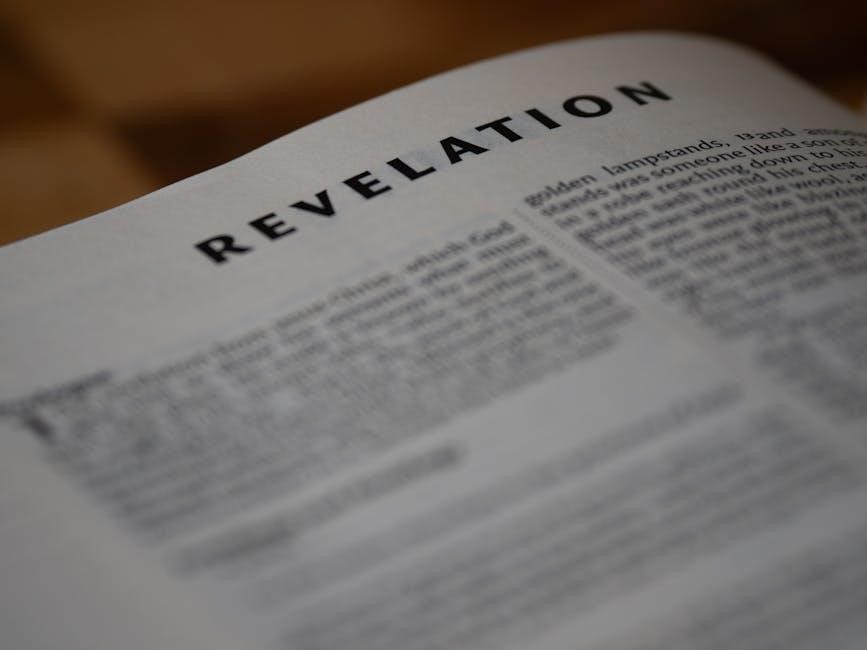C.S. Lewis’s God in the Dock is a thought-provoking collection of essays exploring theology, ethics, and Christianity. Available as a PDF, it delves into divine justice, miracles, and faith, offering timeless insights for spiritual reflection and apologetics.
1.1 Overview of the Book
God in the Dock is a collection of 48 essays by C.S. Lewis, addressing theological and ethical themes. It explores complex topics like evil, miracles, and divine justice, offering insightful reflections on Christianity. The book, available as a PDF, is structured to engage both scholars and general readers, making it accessible for those seeking deeper understanding. Lewis’s essays emphasize the relevance of Christian teachings in addressing modern issues, blending intellectual rigor with practical application. This work remains a vital resource for apologetics and spiritual growth, providing timeless wisdom for navigating faith and reason.

1.2 Significance of the Title “God in the Dock”
The title God in the Dock symbolizes the idea of God being scrutinized or “on trial” in a world questioning divine justice and existence. It reflects humanity’s tendency to judge God, particularly in the face of suffering and evil. The phrase, drawn from legal terminology, underscores the tension between faith and doubt. Lewis uses this metaphor to explore complex theological questions, emphasizing the need to understand God’s nature and purposes. The title highlights the book’s central theme of defending Christianity against modern critiques, offering a compelling apologetic for faith in a challenging and skeptical world.

1.3 C.S. Lewis and His Theological Contributions
C.S. Lewis, a renowned Christian apologist, made significant theological contributions through his works. In God in the Dock, he addresses complex questions about God, evil, and miracles, blending intellectual rigor with accessible language. His essays challenge readers to engage deeply with faith and reason. Lewis’s ability to articulate Christian doctrine in a relatable manner has made his writings enduringly influential. His theological insights continue to guide believers and skeptics alike, offering a bridge between traditional Christianity and contemporary thought, as seen in the PDF versions of his work that remain widely read and studied today.
Key Themes in “God in the Dock”
The book explores the problem of evil, divine justice, miracles, and faith vs. reason, offering profound theological reflections in an accessible manner through its essays.
2.1 The Problem of Evil and Suffering
C.S. Lewis addresses the paradox of evil and suffering in a world created by a benevolent God. He argues that true happiness and fulfillment can only be found in unity with God. Lewis emphasizes that suffering is not a sign of God’s absence but a call to seek divine purpose. He challenges the idea that humans are accidental beings, instead affirming their divine design. Through his essays, Lewis provides theological insights, encouraging readers to trust in God’s plan amidst life’s challenges and to find hope in faith and redemption.
2.2 The Nature of God and Divine Justice
C.S. Lewis explores the nature of God as a God of justice and love, emphasizing divine sovereignty and moral order. He argues that God’s justice is not arbitrary but rooted in His divine nature. Lewis challenges the notion that God is indifferent, instead highlighting His active engagement in human affairs. The essays underscore the importance of living out God’s justice by caring for the marginalized and dismantling unjust systems. Lewis’s perspective on divine justice calls believers to align their actions with God’s moral framework, reflecting His love and righteousness in a world marked by inequality and suffering.
2.3 Miracles and Their Role in Christianity
Miracles, as discussed in God in the Dock, are central to Christianity, serving as divine interventions that reveal God’s power and love. Lewis argues that miracles are not mere spectacles but have profound theological significance, affirming the supernatural nature of God’s interaction with the world. He addresses the tension between natural law and divine intervention, asserting that miracles are not violations of nature but rather expressions of God’s sovereignty. Lewis emphasizes that miracles point to the ultimate miracle: the Incarnation, where God became human to redeem humanity. This essay reaffirms the role of miracles in sustaining faith and understanding God’s redemptive plan.
2.4 The Relationship Between Faith and Reason
C.S. Lewis explores the interplay between faith and reason, arguing that they are not adversaries but complementary paths to understanding God. In God in the Dock, Lewis emphasizes that faith is not irrational but is grounded in reason, which provides the intellectual framework for spiritual truths. He asserts that reason can lead individuals to the threshold of faith, where divine revelation completes the journey. Lewis challenges the notion that faith must oppose logic, instead advocating for a balanced approach where both disciplines work harmoniously to deepen one’s understanding of God’s nature and purpose, ultimately enriching the Christian experience.

Essay Analysis
God in the Dock features 48 essays that delve into theological and ethical dilemmas, offering profound insights into faith, morality, and divine purpose. Each essay examines complex topics, linking profound theological concepts with practical, real-world applications, making it a valuable resource for both scholars and lay readers seeking to deepen their understanding of Christianity.
3.1 “Evil and God”
In “Evil and God,” C;S. Lewis tackles the age-old problem of evil, offering a theological perspective on its existence and God’s justice. Lewis argues that evil arises from human free will, a necessary component of moral responsibility. He emphasizes that divine justice is not about avoiding suffering but about redemption and spiritual growth. The essay challenges the notion that evil disproves God, instead framing it as a consequence of humanity’s choices. Lewis’s reasoning provides a compelling apologetic for the coexistence of evil and an omnipotent, loving God, making this essay a cornerstone of Christian theological discourse.
3.2 “Miracles”

In “Miracles,” C.S. Lewis explores the role of divine intervention in a world governed by natural laws. He argues that miracles are not contradictions of nature but rather supernatural acts that reveal God’s active presence. Lewis distinguishes between magic and miracles, emphasizing that the latter are expressions of God’s love and purpose. He challenges the view that miracles are impossible in a rational universe, asserting that they provide spiritual insight and affirm human dignity. This essay remains a powerful defense of miracles in Christian theology, offering a nuanced perspective on their significance and relevance in modern times.
3.3 “Dogma and the Universe”
In “Dogma and the Universe,” C.S. Lewis examines the relationship between Christian doctrine and the natural world. He argues that dogma, often seen as rigid, is actually a dynamic framework that aligns with the universe’s design. Lewis contends that the doctrines of Christianity, such as the Incarnation, are not merely abstract concepts but are deeply connected to the cosmic order. He uses rational argument and biblical imagery to show how dogma reflects the harmony between God’s nature and creation. This essay challenges readers to see theology as an integral part of understanding the world and humanity’s place within it.
3.4 “Myth Became Fact”
In “Myth Became Fact,” C.S. Lewis explores the concept of myth in relation to Christian theology. He argues that myths are not mere fantasies but expressions of deep truths. Lewis posits that Christianity uniquely fulfills mythical themes through the historical event of the Incarnation, where myth transcends into reality. This essay challenges the notion that myths and facts are mutually exclusive, presenting Christianity as the ultimate synthesis of both. By examining this interplay, Lewis provides a compelling apologetic for the Christian faith, bridging the gap between imagination and historical truth.

Theological and Ethical Discussions
C.S. Lewis’s essays in God in the Dock delve into profound theological and ethical themes, emphasizing the concept of sin, redemption, and prayer’s transformative power; He explores ethical implications of Christian teachings, advocating for compassion and justice, particularly in caring for the marginalized. Lewis’s insights challenge readers to align their actions with divine principles, fostering a deeper understanding of faith’s practical application in everyday life.
4.1 The Concept of Sin and Redemption
C.S. Lewis explores the concept of sin as a fundamental moral failing, separating humanity from God. He emphasizes that sin is not merely an ethical lapse but a rejection of divine love. Redemption, Lewis argues, is achieved through faith in Christ, who bridges the gap between humanity and God. This theological framework underscores the necessity of repentance and grace. Lewis’s essays highlight the transformative power of redemption, urging believers to embody compassion and justice, reflecting God’s love in a world marred by sin. His insights remain pivotal for understanding Christianity’s redemptive message.
4.2 The Role of Prayer in Christian Life
Prayer, as discussed in God in the Dock, is a vital means of communication with God, fostering intimacy and alignment with His will. Lewis emphasizes prayer as a humble acknowledgment of human limitations and a reliance on divine guidance. He encourages believers to pray for wisdom, strength, and discernment, viewing it as a cornerstone of Christian living. Prayer, according to Lewis, is not merely a request for favors but a deeply personal act of surrender and trust in God’s sovereignty. This perspective underscores prayer’s transformative power in shaping one’s spiritual journey and daily life.
4.3 Ethical Implications of Christian Teachings
Christian teachings in God in the Dock emphasize the ethical call to live out God’s love and justice. Lewis highlights the responsibility to care for the marginalized and challenge unjust systems. He underscores the importance of humility, compassion, and selfless service as reflections of Christ’s teachings. The ethical implications extend to personal and societal transformation, encouraging believers to align their actions with divine moral standards. This ethical framework calls for a life of integrity, mercy, and active love, demonstrating the practical impact of faith in addressing human needs and fostering a just society.

The Book’s Structure and Style
God in the Dock is structured as an anthology of 48 essays, each addressing theological and ethical topics. Lewis’s writing is clear, accessible, and engaging, making complex ideas understandable while maintaining a thought-provoking tone.
5.1 Organization of Essays
The essays in God in the Dock are thoughtfully organized, grouping related themes together. This structure enhances readability, allowing readers to follow Lewis’s logical progression through topics like miracles, sin, and redemption. Each essay builds upon the last, creating a cohesive narrative that explores the depth of Christian theology. The PDF version maintains this organization, ensuring that Lewis’s arguments and insights remain accessible and engaging for modern readers seeking to understand complex theological concepts in a clear and structured manner.
5.2 Lewis’s Writing Style and Tone
C.S. Lewis’s writing in God in the Dock is marked by clarity, logic, and a conversational tone, making complex theological concepts accessible. His essays are infused with a sense of intellectual rigor and moral urgency, yet remain approachable. Lewis often employs analogies and rhetorical questions to engage readers, fostering a sense of dialogue. The PDF version preserves his distinctive voice, blending wit, humility, and profound insight. His tone is both compassionate and challenging, encouraging readers to grapple with faith and reason while maintaining a deep respect for the subject matter and his audience.
Historical Context
The essays in God in the Dock were written during the mid-20th century, reflecting theological debates of the time. The PDF highlights their enduring relevance today.
6.1 The Time Period When the Essays Were Written
The essays in God in the Dock were primarily written during the 1940s and 1950s, a period marked by post-war theological discourse and societal change. This era influenced Lewis’s exploration of faith, morality, and the divine. The PDF version captures the historical context, offering insights into how Lewis addressed spiritual questions amidst global upheaval. His works remain relevant, bridging the gap between past and present theological discussions.
6.2 Relevance of the Essays in Modern Times
The essays in God in the Dock remain highly relevant today, offering timeless reflections on faith, morality, and divine justice. The PDF format ensures accessibility, allowing modern readers to engage with Lewis’s insights on universal themes such as evil, suffering, and the role of miracles. His arguments on divine justice and ethical living resonate with contemporary theological debates. The essays also address human struggles with faith and reason, making them a valuable resource for apologetics and spiritual growth in the 21st century. Lewis’s work continues to inspire and challenge readers, proving its enduring significance.
Impact and Legacy
God in the Dock has profoundly influenced Christian theology, offering timeless wisdom on faith and ethics. Its PDF availability ensures its ideas remain accessible, shaping modern apologetics and theological discourse.

7.1 Influence on Christian Theology

C.S. Lewis’s God in the Dock has significantly shaped Christian theology, particularly in addressing complex questions about evil, divine justice, and miracles. The book’s essays, easily accessible in PDF format, provide profound insights into faith and reason, resonating with scholars and laymen alike. Lewis’s ability to articulate theological concepts in an approachable manner has made his work a cornerstone in modern apologetics. By exploring themes such as sin, redemption, and prayer, God in the Dock continues to inspire theological discussions, ensuring its lasting relevance in Christian thought and practice.
7.2 Reception by Critics and Scholars
God in the Dock has received widespread acclaim from both critics and scholars for its intellectual depth and accessibility. The book’s essays, available in PDF format, offer insightful explorations of theology and ethics, resonating with a broad audience. Scholars praise Lewis’s ability to bridge academic theology with everyday faith, making complex ideas understandable. Critics highlight the timeless relevance of his arguments, particularly in essays like “The World’s Last Night,” which challenges readers to reflect on divine justice and human morality. The book remains a vital resource in Christian scholarship and apologetics, ensuring its enduring influence in theological discourse;

Contemporary Relevance
God in the Dock remains highly relevant today, offering timeless theological insights. Its PDF availability ensures accessibility, making it a vital resource for modern apologetics and faith-driven discussions.
8.1 Applying Lewis’s Ideas to Modern Issues
C.S. Lewis’s insights in God in the Dock remain remarkably relevant in addressing contemporary challenges. His exploration of divine justice, morality, and faith resonates with modern debates on skepticism, secularism, and ethical dilemmas. The essays, readily available as a PDF, provide a foundational apologetic resource for navigating issues like moral relativism and the intersection of faith with science and technology. Lewis’s reasoning encourages believers to engage thoughtfully with a changing world, ensuring his theological reflections continue to inspire and guide in addressing today’s complex spiritual and ethical questions.
8.2 The Book’s Role in Apologetics Today
God in the Dock serves as a powerful tool in modern Christian apologetics, offering clear, logical defenses of faith. Available as a PDF, its essays address timeless questions about evil, miracles, and divine justice, equipping believers to articulate their faith persuasively. Lewis’s accessible style makes complex theological concepts understandable, aiding apologists in engaging skeptics and fostering spiritual dialogue. The book’s enduring relevance ensures its continued use in defending Christianity against contemporary challenges, making it an indispensable resource for those seeking to share their faith with clarity and conviction in today’s world.
God in the Dock remains a profound exploration of faith and theology, offering timeless insights. Its availability as a PDF ensures its enduring relevance and accessibility for modern readers seeking spiritual guidance and intellectual depth.
9.1 Summary of Key Points
God in the Dock is a compelling collection of essays by C.S. Lewis, addressing theology, ethics, and Christianity. The book, available as a PDF, explores themes like divine justice, miracles, and the interplay of faith and reason. Lewis’s insights challenge readers to reflect on Christianity’s relevance in modern life. His writings emphasize the importance of living out faith authentically and understanding God’s role in a world filled with suffering and complexity. The essays remain a vital resource for spiritual growth and apologetics, offering timeless wisdom for navigating life’s deepest questions.
9.2 Final Thoughts on “God in the Dock”
God in the Dock stands as a testament to C.S. Lewis’s profound theological insights, offering readers a deeper understanding of Christianity’s complexities. Through its exploration of divine justice, miracles, and the interplay of faith and reason, the book challenges readers to grapple with life’s profound questions. Available as a PDF, it remains a vital resource for spiritual growth and apologetics. Lewis’s ability to articulate complex ideas with clarity makes the book accessible to both scholars and laypersons. Ultimately, God in the Dock inspires reflection, encouraging readers to live out their faith authentically in a world filled with challenges and uncertainties.

Be First to Comment